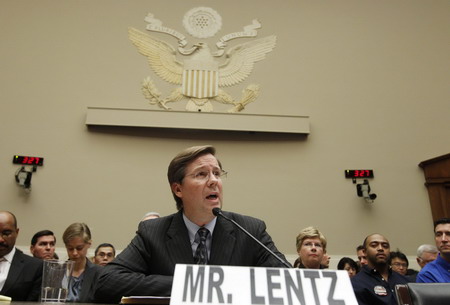Asia-Pacific
Toyota recalls won't 'totally' fix sudden surges
(Agencies)
Updated: 2010-02-24 09:15
 |
Large Medium Small |
|
 James Lentz, Toyota President and COO of Motor Sales in the US, testifies before a House Energy and Commerce Oversight and Investigations Subcommittee hearing on the "Response By Toyota and NHTSA (National Highway Traffic Safety Administration) to Incidents of Sudden Unintended Acceleration" on Capitol Hill in Washington February 23, 2010. [Agencies] |
WASHINGTON: Massive recalls of popular Toyota cars and trucks still may "not totally" solve frightening problems of sudden, unintended acceleration, the company's American sales chief conceded Tuesday, a day before the Japanese president of the world's largest automaker must confront angry US lawmakers.
House members listened in rapt silence Tuesday to the tearful testimony of a woman whose car unaccountably surged to 100 mph, then they pressed US sales chief James Lentz on the company's efforts to find and fix the acceleration problems - actions many suggested were too late and too limited.
Lentz apologized repeatedly for safety defects that led to recalls of some 8.5 million Toyota cars and trucks, and he acknowledged the changes the company is making probably aren't the end of the story.
Putting remaining doubts to rest is of vital importance to millions more Toyota owners in the United States and elsewhere, who have continued to drive but with serious concerns about their cars. Toyota sales have suffered, too, and a small army of dealers showed up on Capitol Hill Tuesday, arguing that this week's high-profile hearings are unfairly targeting their company.
"We are vigilant and we continue to look for potential causes," Lentz told the House Energy and Commerce Committee.
That search had better continue, a number of lawmakers said, openly questioning Toyota's insistence that the problems are mechanical, not linked to the vehicles' sophisticated electronics.
Without a more vigorous investigation of the possibility that electronics are involved, Texas Republican Rep. Joe Barton said of Toyota's probe: "In my opinion, it's a sham."
Lentz's appearance set the stage for Toyota's president - Akio Toyoda, grandson of the company's founder - to apologize in person on Wednesday.
Toyoda will accept "full responsibility" for the halting steps that led to the recall, according to prepared testimony released in advance. He also will offer his condolences over the deaths of four San Diego, Calif., family members in a crash of their Toyota in late August.
"I will do everything in my power to ensure that such a tragedy never happens again," Toyoda will tell the House Government Oversight Committee. "My name is on every car. You have my personal commitment that Toyota will work vigorously and unceasingly to restore the trust of our customers."
"Quite frankly, I fear the pace at which we have grown may have been too quick" and led to safety defects at the heart of the recall, Toyoda says in his prepared testimony.
There were repeated displays of emotion at Tuesday's daylong hearing - both from the Tennessee woman who survived a 2006 sudden acceleration incident when she was unable to control her runaway Lexus and from Lentz himself, who choked up while discussing the death of his own brother more than 20 years ago in a car accident.
"I know what those families go through," Lentz said.
Rhonda Smith, of Sevierville, Tenn., said her Lexus raced out of control to speeds up to 100 miles an hour, and that nothing she did to try to stop it worked - including braking and shifting into neutral. "I prayed to God to help me," she said, fighting back tears.
"After six miles, God intervened" and slowed the car, Smith said. She said she was finally able to pull off the road onto a median and turn off the engine. She said it took a long time for Toyota to respond to her complaints and even then it was dismissive.
"Shame on you, Toyota, for being so greedy," Smith said as Lentz sat grim-faced with other Toyota officials in the first row of the committee room awaiting his turn to testify. She directed a second "shame on you" at federal highway safety regulators "for not doing your job."
"Listening to Mrs. Smith, I'm embarrassed for what happened," Lentz said. Pressed by committee members as to why Toyota had not had its technicians pour over the Smith car to determine what actually caused the malfunction, Lentz said he wasn't sure where the car was now but "We're going to go down and talk to them and get the car so that they feel satisfied. I want her and her husband to feel safe about driving our products."











